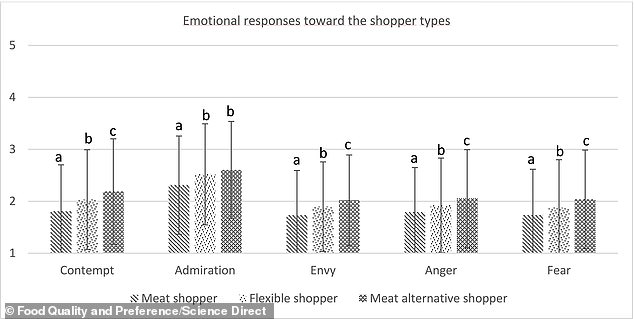- EXPLORE FURTHER: Can YOU identify genuine meat? Researchers develop synthetic lamb and beef
Scientists have uncovered the actual cause behind people’s dislike of vegans, suggesting that meat eaters might just envy them.
In their research, scholars from the University of Vaasa, Finland , aimed to uncover why the plant-based diet continues to be widely criticized in Europe.
The team recruited 3,600 participants and inquired about their views on those who favor alternatives to meat.
The findings presented a 'contradictory image'.
On one side, vegans were considered eco-friendly, health-conscious individuals deserving of respect.
However, conversely, they also elicited feelings of fear, envy, contempt, and anger.
Dr. Roosa-Maaria Malila, one of the study’s authors, stated, "The consumption of meat and meat alternatives is a deeply contentious social issue."
Based on our findings, people who favor plant-based options are seen as socially distinct – and this distinction isn’t viewed positively.


As per Statistica, in 2023, approximately 6.62 million people identified as vegan across Europe.
Furthermore, this number is anticipated to increase to an impressive 8.25 million by the year 2033.
Even with this growth, veganism continues to be stigmatized – and the researchers aimed to uncover the reasons behind this.
In their research, the scientists presented participants with hypothetical shoppers' lists and then queried them about their impressions of these made-up consumers.
There were three distinct shopping lists provided.
Each of the three plans featured the same five core items: pasta, bread, apple juice, carrots, and bananas; however, they differed according to whether they incorporated animal or plant-based proteins.
As an illustration, one shopping cart held ground meat, deli meats, and sausages, whereas another carried chicken rolls along with veggie sausages.
The third option featured exclusively plant-based items such as vegetable dumplings and veggie sausages.

The findings showed that the participants perceived fictional consumers who favored vegetarian food as being environmentally conscious, health-aware, and ethical.
Nevertheless, the researchers discovered that the participants were more prone to exhibit feelings of fear, jealousy, contempt, and anger toward them.
Dr. Malila mentioned that people were inclined to behave aggressively toward vegetarians or isolate them socially.
As per the researchers, these outcomes mirror the 'dominant climate.'
Dr. Malila further noted that the varied sentiments toward vegetarians mirror the current atmosphere where the necessity to decrease meat intake for ecological purposes will undoubtedly no longer be unexpected for anybody.
'It's understandable that altering personal consumption patterns isn't easy.'
This may manifest as frustration and be directed towards those already spearheading change.
Certainly, the anxiety about losing the advantages obtained can lead to comparable emotions. Even though adopting a vegetarian diet doesn’t necessarily mean making sacrifices, the perception surrounding it might suggest otherwise.
Read more
Out Of Topic Show Konversi KodeHide Konversi Kode Show EmoticonHide Emoticon